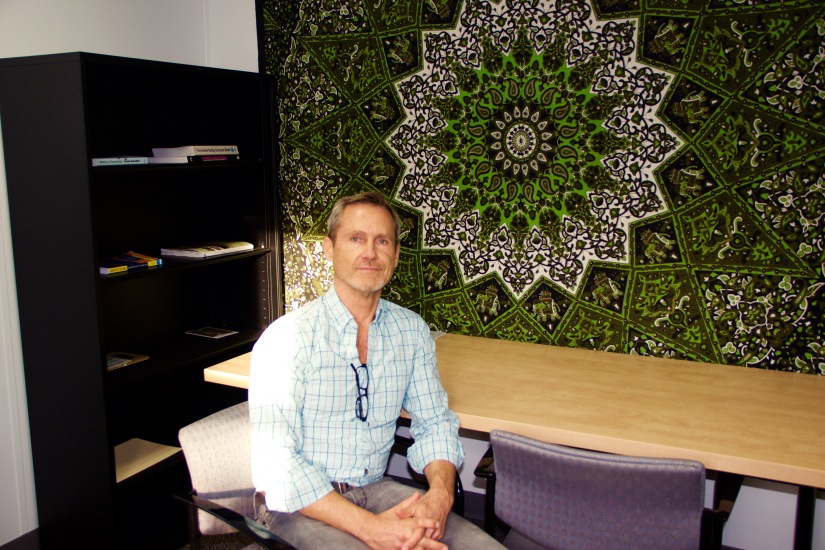
Allen Zimmerman is an Visiting Assistant Professor of advertising at the University of Tampa. He has years of advertising experience from working at large agencies in Washington, D.C. and New York City. He also takes pride in his yoga practice, which has impacted his life and career path in many ways. Professor Zimmerman was kind enough to answer questions about his background with various advertising agencies and the challenges that he faced.
Before becoming an Advertising professor at UT, where did you work, and what companies were they?
I started in advertising in Washington, D.C. and worked at the number two biggest firm there called Ehrlich Manes. Some of the clients I worked with were consumer advertising clients. GEICO was one of them, as well as Oldsmobile and People’s Drugstore which is now CVS. So I got to work on brands like that. Then I actually got hired by my client, GEICO. I got to work in the GEICO Marketing Department for five years. I got my MBA during the night while I was working there. After I got the MBA, I actually went to New York City and worked for pharmaceutical advertising agencies. The biggest one that probably everyone would know is DraftFCB Healthcare. I think it’s called just FCB Health now.
How did you learn that you were interested in the Advertising industry?
Even as a kid, I always thought it would be fun. So, when I was young, back then we didn’t have phones or anything. We had recorders. A friend of mine and I, we used to record commercials and then make fun of them because we just thought it was hysterical. So we would just trash commercials. I don’t know if that’s a good reason to go into advertising. But, I liked it from the early age from when I was an Econ major. I hated Economics so much. I just wanted to get out of school, so I thought I’d better be doing something that I like, and I started applying to jobs in advertising.
Why did you go from working in the field to teaching it? Was there a specific event that made you realize that you wanted to teach instead?
So I started getting into yoga and meditation, and doing a lot more thinking about where I wanted my life to go. So it’s sort of that mid-life thing. I just felt like Advertising was fun and Pharma was interesting and challenging, but I felt like it was ethically challenging in a number of ways.
There were times when they asked our agency to help on a campaign trying to promote cigarettes to Asia. When I was working at Pharma, I had to sit through a presentation about one of their top scientists who was describing how they got one of their drugs approved for sale. It included animal testing, and it was for Zoloft, an antidepressant. They were trying to get it approved for anxiety, so they had to instill anxiety into animals. They put them in wire cages and subjected them to random inescapable shock. So, basically, they electrocuted them out of random. We were also promoting that same drug to children before they knew it caused suicide. After a while it felt like in some ways we were justifying “Hey, this feels good, we’re selling medicine that helps people.” But it was really much more than people needed. It really crossed the line ethically. I feel like by teaching advertising I can make students aware of the techniques and have all the fun, but I feel like I’m giving back. That way, I can explain some of these things, and let you choose to see what industries you want to work in. When I graduated, I thought you were supposed to make the most money you can, get the best job, get a bigger house, and all that stuff. I like to challenge students with the idea that maybe you don’t need that. Do something that you’re really happy with, and also makes you feel good about yourself.
You’ve mentioned that yoga is one of your hobbies outside of the classroom. How did you first get into yoga?
It was really weird. A friend of mine came up to me and said “I’m working at a yoga studio, here’s a free pass.” I had never done it, and I thought it was just a practice for women and I’m not going to like it. He said, “No, here’s a free pass, just go try it, this is a really good yoga studio.” I just thought for some reason “why not?” I literally went, and from the first day I just loved it. It was amazing. So I just got hooked on it, and I started to go a couple days a week. Then I started going regularly, and then actually went to teacher training. You can become certified to teach, so I did that. I went to San Francisco for a couple years and I taught school and yoga. It just became part of my life.
Are there core values that yoga has taught you?
Yes. Number one is Ahimsa. It means “do no harm.” So, I try to live my life according to these yoga principles, which are simple but are actually really deep. You can’t do no harm; it’s almost impossible. But, you can try to do the least harm you can. That means you don’t try to hurt people and you don’t try to hurt animals. You don’t buy products or involved yourself in services where they’re involved in hurting people, animals, or the planet for that matter. It makes life very simple for me, and it’s hard to make those choices, but to me it’s worth it. It gives me a peace of mind.
How has yoga impacted the way you work and teach?
It completely changed the way I do that. I don’t just teach advertising, because I know how advertising works. I know the techniques, I know how they sell to people, and I understand human psychology and how to manipulate people; that can be used for good or bad reasons. Yoga influenced me to share these techniques with students, but from the perspective of “Is this done in an ethical manner or not?” If you know how to do it when you leave here, it’s up to you when you get into advertising or PR how you use these techniques. I always encourage people and my students to think about that. I think that’s the greatest thing I can do; to open people’s eyes to the fact that not everything is ethically good and we really can make a difference by the choices we make.
The advertising industry can be very competitive, “cut throat”, and stressful. Have you ever worked on an advertising campaign that went against your personal values, and how did you go about handling it with your superiors?
That’s really tough. You can get yourself in a lot of trouble if you start to go against your agency. Let me give you a couple of examples.
With that cigarette campaign, they sent an email to the whole agency asking for ideas and help with this campaign to sell cigarettes in Asia. This was back before they stopped doing it with “hit reply all” and it would go to hundreds of people. I just put something in the subject that said “Are Asian lives worth less than American lives?” and that was it. I had sent it to everybody. I got called into HR. I was basically told that if I ever did something like that again, like “don’t bite the hand that feeds you”, you’re out. That was number one. But I kept my job, and I kept working.
With the animal testing, I didn’t quit on the spot, I just got up and left the room I was in with my clients to just breathe and come back. I didn’t quit right away, so I don’t try to pretend like I’m some perfect person or a saint. I kept the job for a couple years, but the feeling just grew on me. I was increasingly unhappy with it. It didn’t feel right inside. That’s what I try to share with students; that you’ve got to judge for yourself. It gets to the point where that stuff wasn’t worth it. It just wasn’t.
Interview has been edited for brevity, clarity, and style.

